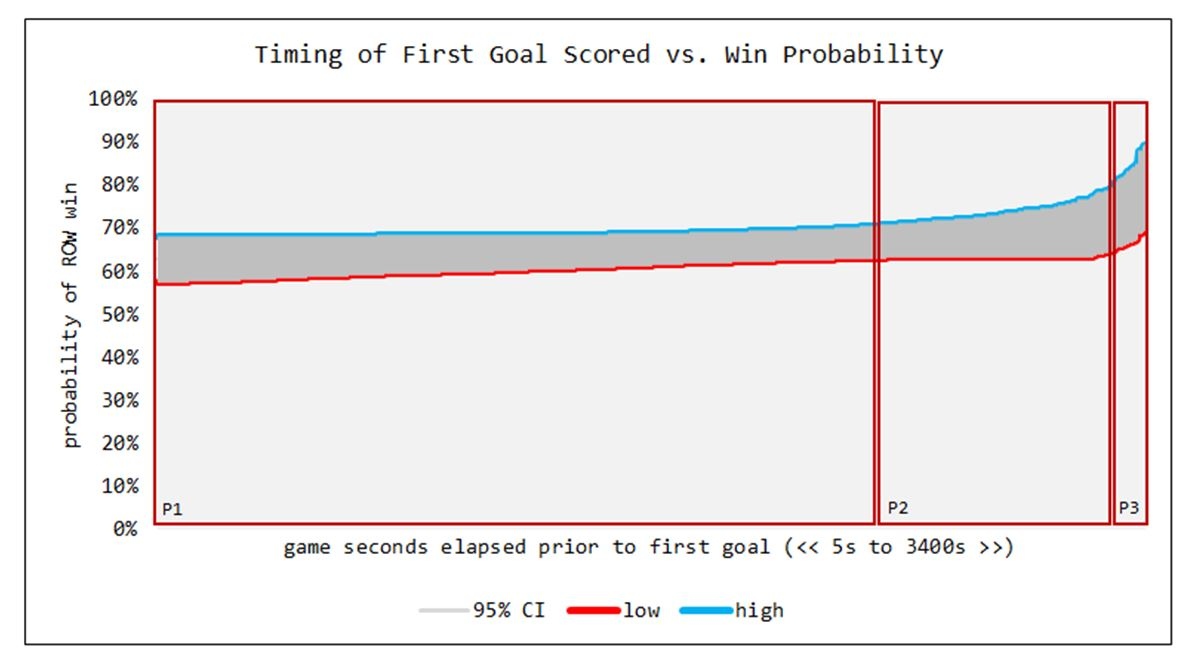May 23, 2019
Getting an early lead is great, but not because it’s early
Both the Blues and Bruins have shown a knack for getting the first goal of the game during the playoffs. But how important is striking early? Travis Yost has more.
By Travis Yost

On Wednesday, the TSN Hockey panel discussed the importance of the first goal when previewing the upcoming Stanley Cup final between the St. Louis Blues and Boston Bruins.
TSN Hockey Insider Bob McKenzie rightly pointed out that St. Louis not only has a knack for scoring the first goal (in 13 of 19 playoff games), but scoring the first goal quite early in games. The group also noted that Boston has had a similar flair for scoring the first (in 13 of 17 games) this postseason.
So how valuable will scoring the first goal be in this upcoming series? There’s an interesting mathematical quirk to that question and the answer might surprise you: it’s the exact same as it would be in any other game, any other series, or any other Stanley Cup final.
The team that scores first will win 67 per cent of the time. The team that scores second will win 67 per cent of the time. The team that scores third will win 67 per cent of the time. And on and on. (For the math friendly, there is a great explainer on this at HockeyGraphs.)
To summarize that long piece in one paragraph: If a team wins a hockey game, it tends to do so by scoring about two thirds of the total goals. The easy way to think about this is that the average hockey game in the 2018-19 season sees about six goals (it was 6.1 in 2018-19), and the average winning team scored about four of those goals (4.1 in 2018-19). Divide it out and you can see why no goal is particularly more or less valuable than another and why the average winning team carried two thirds of the total goals.
But the TSN Hockey panel also talked about the timing of the first goal, which is particularly interesting in the case of St. Louis, who (at least recently) has been getting out to early leads.
Since we already know that the winning team scores the first goal about 67 per cent of the time, I thought it would be interesting to see how that shifts or changes when you bring in the time component.
The data below shows a random sampling of games from the 2018-19 season where (a) a first goal was scored; and (b) the game ended in regulation or overtime. The theme is the same – the team that scores the first goal wins about 67 per cent of the time – but the likelihood of winning the game increases as time remaining in the game decreases.
That also should make intuitive sense, because trailing teams always have two adversaries: their opponent on the night and the amount of time remaining to equalize. The less time you have available, the less of a chance you have at erasing any sort of deficit:

Does this mean teams should ‘wait’ to score the first goal until later on in the game? Of course not.
Games that are close on the scoreboard tend to be indicative of two comparatively talented teams. When you have decisive talent disparities (think Tampa Bay playing Ottawa this season as a quick example), you would expect the Lightning to score early in the game. You would also expect Tampa Bay to continue scoring as the game progresses, furthering the goal differential and ensuring a decisive victory in the process. (The point being that Tampa Bay was successful because they ran up crazy goal differentials on their opponents.)
In other words, an early lead is great, but not because it’s early. The lead is what matters. Once you have that, the rest becomes an exercise in game management.

